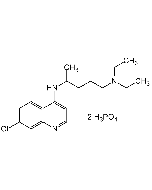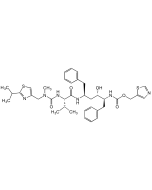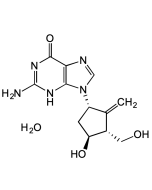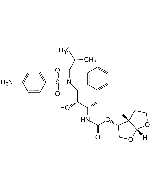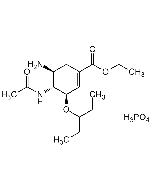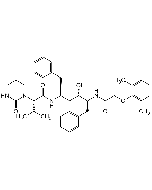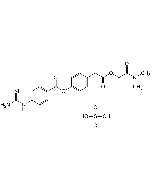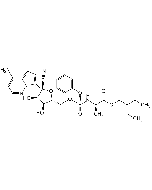Cookie Policy: This site uses cookies to improve your experience. You can find out more about our use of cookies in our Privacy Policy. By continuing to browse this site you agree to our use of cookies.
AdipoGen Life Sciences
Hydroxychloroquine . sulfate
As low as
40
CHF
CHF 40.00
In stock
Only %1 left
AG-CR1-3720-M05050 mgCHF 40.00
AG-CR1-3720-M250250 mgCHF 160.00
AG-CR1-3720-G0011 gCHF 200.00
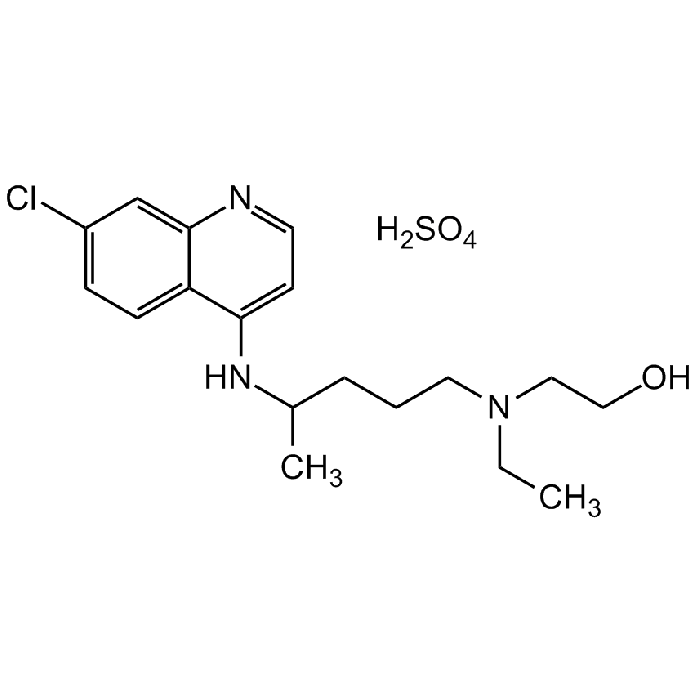
| Product Details | |
|---|---|
| Synonyms | 2-[[4-[(7-Chloro-4-quinolinyl)amino]pentyl]ethylamino]-ethanol monosulfate; HCQ; NSC 4375 |
| Product Type | Chemical |
| Properties | |
| Formula |
C18H26ClN3O . H2SO4 |
| MW | 335.9 . 98.1 |
| CAS | 747-36-4 |
| RTECS | KK3342500 |
| Purity Chemicals | ≥98% (HPLC) |
| Appearance | White to off-white solid. |
| Solubility | Soluble in water (20mg/ml). |
| Identity | Determined by 1H-NMR. |
| InChi Key | JCBIVZZPXRZKTI-UHFFFAOYSA-N |
| Smiles | ClC1=CC=C(C(NC(CCCN(CC)CCO)C)=CC=N2)C2=C1.O=S(O)(O)=O |
| Shipping and Handling | |
| Shipping | AMBIENT |
| Short Term Storage | +4°C |
| Long Term Storage | -20°C |
| Handling Advice | Keep cool and dry. |
| Use/Stability | Stable for at least 2 years after receipt when stored at -20°C. |
| Documents | |
| MSDS |
 Download PDF Download PDF |
| Product Specification Sheet | |
| Datasheet |
 Download PDF Download PDF |
Description
- Hydroxychloroquine is a synthetic less toxic derivative of chloroquine (Prod. No. AG-CR1-3721), commonly used as an antimalarial drug.
- Hydroxychloroquine has anti-inflammatory, immunomodulating, anti-infective, antiviral, antithrombotic and metabolic effects. It has anticancer properties, related to their strong antiproliferative, antimutagenic, epigenetic and autophagy inhibiting and apoptosis inducing activities.
- Hydroxychloroquine is used to treat rheumatoid arthritis, systemic lupus erythematosus, antiphospholipid antibody syndrome and Sjögren's syndrome. Hydroxychloroquine interfers with lysosomal activity and autophagy, interacts with membrane stability and alters signaling pathways and transcriptional activity, which can result in inhibition of cytokine production and modulation of certain co-stimulatory molecules.
- It increases lysosomal pH in antigen-presenting cells and blocks in inflammatory conditions, toll-like receptors on plasmacytoid dendritic cells (PDCs). By decreasing TLR signaling, it reduces the activation of dendritic cells and the inflammatory process. It also acts as an antagonist TLR7 and TLR9.
- Hydroxychloroquine shows antiviral activity against several viruses by inhibiting viral replication and inhibits SARS-CoV-2 viral infection (COVID-19), in vitro.
Product References
- Inhibition of macroautophagy triggers apoptosis: P. Boya, et al.; Mol. Cell Biol. 25, 1025 (2005)
- New insights into the antiviral effects of chloroquine: A. Savarino, et al.; Lancet Infect. Dis. 6, 67 (2006)
- Hydroxychloroquine modulates metabolic activity and proliferation and induces autophagic cell death of human dermal fibroblasts: B. Ramser, et al.; J. Invest. Dermatol. 129, 2419 (2009)
- Current and novel therapeutics in the treatment of systemic lupus erythematosus: C. Yildirim-Toruner & B. Diamond; J. Allergy Clin. Immunol. 127, 303 (2011)
- Hydroxychloroquine: From malaria to autoimmunity: I. Ben-Zvi, et al.; Clin. Rev. Allergy Immunol. 42, 145 (2012)
- Novel small molecule inhibitors of TLR7 and TLR9: mechanism of action and efficacy in vivo: M. Lamphier, et al.; Mol. Pharmacol. 85, 429 (2014)
- Current and Future Use of Chloroquine and Hydroxychloroquine in Infectious, Immune, Neoplastic, and Neurological Diseases: A Mini-Review: D. Plantone & T. Koudriavtseva; Clin. Drug Investig. 38, 653 (2018) (Review)
- The clinical value of using chloroquine or hydroxychloroquine as autophagy inhibitors in the treatment of cancers: A systematic review and meta-analysis: R. Xu, et al.; Medicine 97, e12912 (2018) (Review)
- A drug repurposing screening reveals a novel epigenetic activity of hydroxychloroquine: R. Catalano, et al.; Eur. J. Med. Chem. 183, 111715 (2019)
- Hydroxychloroquine, a less toxic derivative of chloroquine, is effective in inhibiting SARS-CoV-2 infection in vitro: J. Liu, et al.; Cell Discov. 6, 16 (2020)
- Mechanisms of action of hydroxychloroquine and chloroquine: implications for rheumatology: E. Schrezenmeier & T. Dorner; Nat. Rev. Rheumatol. 16, 155 (2020) (Review)
- To consider or not antimalarials as a prophylactic intervention in the SARS-CoV-2 (Covid-19) pandemic: F.R. Spinelli, et al.; Ann. Rheum. Dis. (Epub ahead of print) (2020)
- New insights on the antiviral effects of chloroquine against coronavirus: what to expect for COVID-19? C.A. Devaux, et al.; Int. J. Antimicrob. Agents. (Epub ahead of print) (2020)






